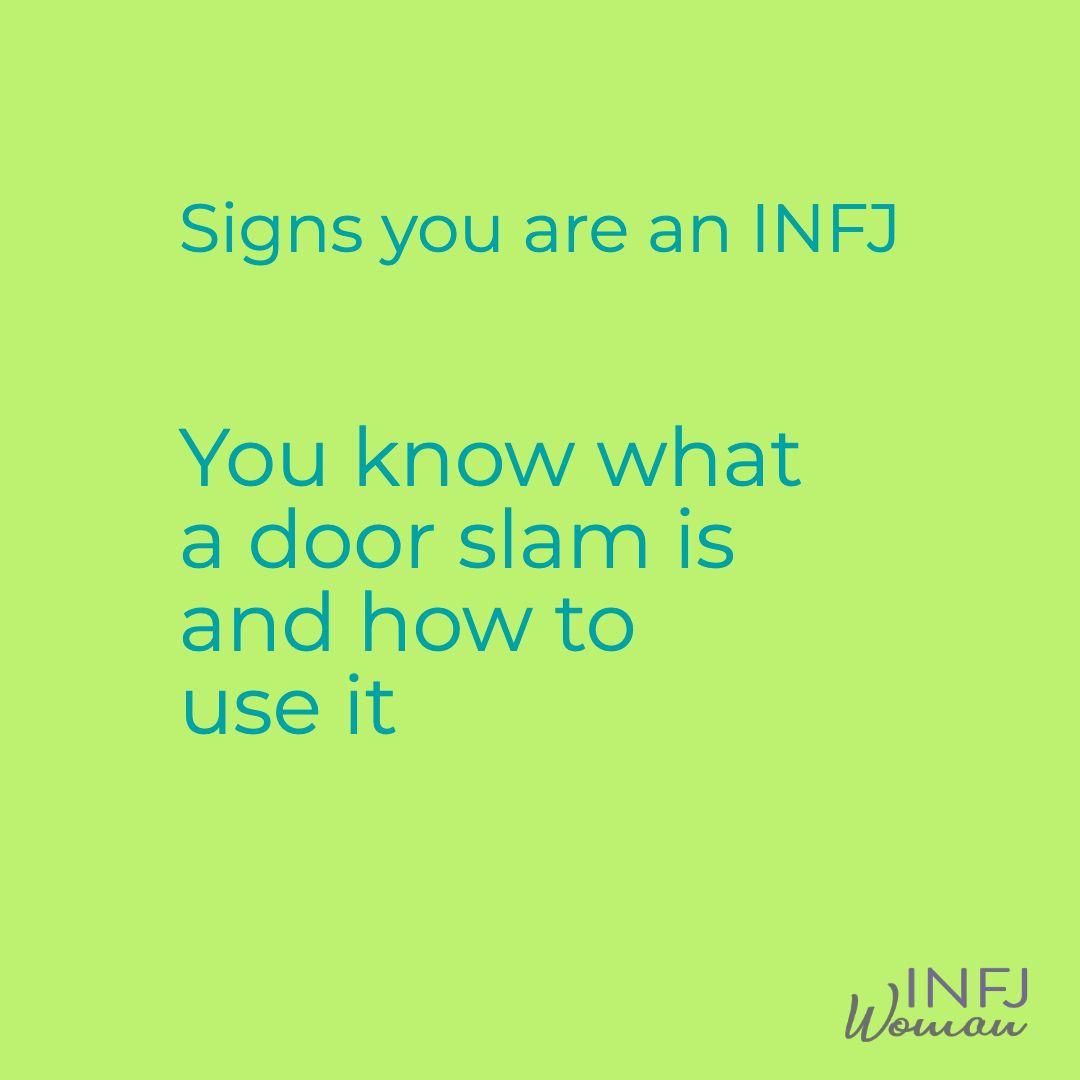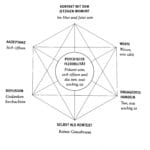Have you ever experienced the bewildering silence of someone you were close to suddenly cutting you off, seemingly without explanation? One minute you’re connected, the next you’re locked out. This experience might be a taste of the INFJ “door slam,” a complex emotional process often misunderstood as cold and callous. This article delves into the intricacies of the INFJ door slam, exploring the underlying psychology, recognizing the subtle warning signs, and offering guidance for navigating the aftermath, whether you’re the INFJ or the one left wondering what happened. We’ll also explore how the insights gained from understanding the INFJ door slam can be applied to relationships in general, even beyond this specific personality type.
Decoding the Door Slam: What It Really Is
The INFJ door slam isn’t a dramatic, explosive outburst; it’s more like quietly, firmly closing a heavy vault door. It’s a decisive withdrawal from a relationship, often leaving those on the receiving end feeling bewildered and hurt. This act of self-preservation is often a last resort, taken after repeated attempts to communicate needs and establish boundaries have gone unheeded. Think of it less as a theatrical bang and more like a quiet, firm click of a lock. It’s not usually about anger, but more about hitting an emotional wall.
Recognizing the Warning Signs: The Gradual Fade
The INFJ door slam rarely happens out of the blue. It’s usually preceded by a slow burn, a gradual retreat. Conversations might become shorter, responses less frequent, and the INFJ’s usual warmth and enthusiasm may fade into polite detachment. They might seem distant, preoccupied, or less engaged than usual—almost as if they’re slowly turning down the volume on the relationship. These subtle changes are crucial early indicators that something is amiss and might even precede a complete disconnection.
Unpacking the Triggers: What Pushes an INFJ to This Point?
So, what ultimately pushes an INFJ to this point of no return? Hurt and betrayal are often the primary culprits. Think consistent dishonesty, repeated broken promises, or the subtle sting of emotional manipulation. Sometimes, it’s not even about malicious intent. The constant drain of a demanding relationship or the persistent drip-drip-drip of negativity can overload their emotional circuits. INFJs are deeply empathetic, and absorbing negativity takes a toll. They invest intensely in their relationships, so when these connections are repeatedly damaged, they might reach a point of emotional exhaustion. Overwhelm, whether from toxic interactions or simply too much negativity, can force their hand, the door slam becoming a desperate attempt to breathe again. It’s their way of protecting themselves, a final boundary put in place after repeated hurts.
Navigating the Aftermath: The Fallout
The effects of the door slam ripple outwards, impacting both the INFJ and the person on the receiving end. For the INFJ, it can bring a sense of relief, a feeling of reclaiming control over their emotional space. But it can also be tinged with sadness, a quiet grief for the connection lost. The person who’s been “door slammed” is often left grappling with unanswered questions, wondering what went wrong and if the situation is salvageable. Earlier understanding and different actions might have made a difference, but the silence makes it hard to determine why they were shut out.
Coping and Strategies: Picking Up the Pieces
For the INFJ
If you’re an INFJ who struggles with this tendency, self-reflection is crucial. Understanding your triggers, recognizing your emotional limits, and learning how to communicate your needs effectively can help prevent future door slams. Therapy can also offer valuable guidance and support, providing a safe space to explore the underlying reasons for this behavior and develop healthier coping mechanisms.
For Those on the Receiving End
If you’re on the receiving end, try to see it from the INFJ’s perspective. It’s likely not a personal attack, but rather a desperate attempt at self-preservation. Respect their need for space and avoid pushing for contact. Genuine apologies and demonstrably changed behavior might eventually create an opening, but there’s no guarantee of reconciliation.
The Possibility of a Second Act: Reversibility and Nuances
Is every door slam truly final? Not necessarily. While some represent permanent closures, others might be more like extended pauses. A true reversal requires significant, consistent change from the other party, a genuine attempt to understand the INFJ’s perspective, and a great deal of patience. It’s a long and often uncertain journey, but the possibility of reconnection exists, a testament to the INFJ’s remarkable capacity for forgiveness. Understanding the nuances of the door slam is crucial. Not all disengagements are created equal. Recognizing the difference between a temporary retreat and a permanent closure can prevent misunderstandings and foster more effective communication.
Avoiding Misinterpretations: Is It Really a Door Slam?
It’s important to remember that other personality types might exhibit similar withdrawal behaviors. Conflict avoidance takes many forms, and misinterpreting a temporary retreat as a full-blown INFJ door slam can unnecessarily escalate situations. Truly understanding the motivations and unique characteristics of the INFJ door slam is vital for accurate assessment. This helps avoid mislabeling behaviors and encourages more effective responses. Clear communication, empathy, and a willingness to understand the complex dynamics at play are all essential.
Why do INFJs Seem Distant? Beyond the Door Slam
INFJs’ tendency to withdraw isn’t always a dramatic, relationship-ending event. Sometimes, it’s simply part of their everyday life. Even in healthy relationships, they may appear distant, lost in thought, or emotionally unavailable. This can be confusing for those who don’t understand the reasons behind this behavior. Understanding why INFJs seem distant can strengthen relationships and foster deeper connections.
One contributing factor is their dominant cognitive function: Introverted Intuition (Ni). Ni constantly analyzes information, searching for underlying meanings. This internal focus can make them seem detached from the present moment, even when physically present. Another factor is their Extroverted Feeling (Fe). INFJs are deeply empathetic and absorb the emotions of others intensely. This sensitivity can be overwhelming, leading them to withdraw to protect themselves. This explains why they might need to step back from social situations, even close relationships, to process and recharge.
So, how can you connect with an INFJ without overwhelming them? Respect their need for alone time and create opportunities for deep, meaningful conversations. By understanding their need for introspection, we can build stronger bonds with these complex and insightful individuals. Their tendency to withdraw isn’t a flaw; it’s a reflection of their rich inner life and empathetic nature.
What is the Psychology Behind Door Slamming? A Deeper Look
While often associated with INFJs, “door slamming” isn’t unique to them. It’s a human response to emotional overload and persistent relational hurt. It’s a defense mechanism, an emotional circuit breaker that trips when the voltage of negativity, crossed boundaries, and emotional exhaustion gets too high.
Why might INFJs be more prone to this? They invest heavily in relationships and strive for harmony. Their deep empathy makes them incredibly sensitive to the emotions of others, potentially leading to emotional overload in toxic environments. Their intuition (Ni) may also allow them to sense an unhealthy relationship long before others do, and their strong values (Fe) make it difficult to stay in situations that clash with their core beliefs.
The effects of a “door slam” ripple outward. The person who initiated it often feels relief mingled with sadness and perhaps guilt. The person on the receiving end is frequently bewildered, grappling with unanswered questions and hurt feelings.
Is reconciliation possible? Healing and growth are possible, but challenging. Self-reflection is crucial for both parties. The person who initiated the separation needs to understand contributing patterns. The other person needs to honestly assess their behavior and consider if they crossed boundaries. Reconciliation is sometimes possible, but requires significant effort, open communication, acknowledgment of past hurts, and a commitment to respecting boundaries. It’s a difficult road, but with empathy, patience, and genuine change, a closed door can cautiously reopen.
Stay informed about the latest developments and expert analysis on fintechzoom ford stock to make well-informed investment decisions. Unlock the secrets to absolute land ownership and discover the fascinating process of acquiring how to get an allodial title, potentially freeing yourself from traditional property constraints.
The psychology of “door slamming” is complex. Ongoing research suggests that various factors, including personality, attachment style, and cultural context, may influence its manifestation. It’s about recognizing the human need for self-preservation and navigating relationships with empathy and respect.
- Discover Long Black Pepper: Flavor & Health Benefits - April 25, 2025
- Shocking Twists: The Grownup Review: Unreliable Narration - April 25, 2025
- A Quiet Place Book vs Movie: A Deep Dive - April 25, 2025

















1 thought on “Understanding the INFJ Door Slam: Why It Happens and How to Navigate It”
Comments are closed.